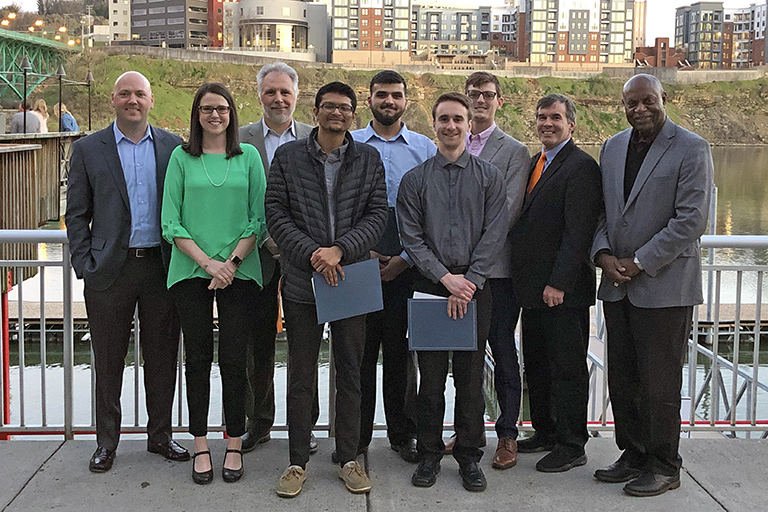
AECOM representatives presented scholarships to four students pursuing the Nuclear Decommissioning & Environmental Management minor. Pictured, from left to right: Joe Aylor, Business Development Director, AECOM; Ashley Saunders, Chief of Staff, UCOR; Ken Rueter, President and CEO, UCOR; Parth Patel, senior; Assam Iysheh, junior; John Wagner, junior; Joseph Galan, sophomore; Wes Hines, Nuclear Engineering Department Head; Harold Connor, and Senior Advisor to the Office of the President, UCOR.
The first nuclear decommissioning and environmental management minor offered by any major educational institution in the United States is drawing student interest and industry praise as the number of commercial nuclear power plants and government defense facilities slated for shut down and cleanup continues to grow.
Currently, 20 students have chosen to pursue the decommissioning minor at the University of Tennessee, Knoxville. Four graduated in 2018 with another 16 on track to complete the program by next year.
The focus on nuclear decommissioning is the result of a collaboration among educators and UCOR, an AECOM-led partnership with Jacobs and a leading government contractor.
It began with Wesley Hines, head of the UT Department of Nuclear Engineering. Hines was inspired by a presentation given by Eric Abelquist, executive vice president of Oak Ridge Associated Universities in April 2015.
Soon after, the idea received a critical boost from UCOR, which is responsible for environmental cleanup of the Department of Energy’s East Tennessee Technology Park and other parts of the Oak Ridge Reservation.
UCOR executives shared Abelquist’s belief that the growing scope of decommissioning work in the government and commercial sectors is creating “a lucrative niche for years to come.”
Abelquist noted that more than 50 percent of the 430 operational nuclear reactors worldwide are more than 30 years old, and nearly 40 percent of existing nuclear capacity will be retired by 2040. The US currently has about 100 nuclear plants generating electricity. A number of these plants have been shut down or will be in the next two decades. They will require removal of nuclear materials and other hazards and cleanup to allow the sites to be used for other purposes.
As Hines considered the idea of training more decommissioning specialists, he received ready encouragement from Ken Rueter, UCOR’s president and CEO, and Matt Marston, UCOR’s former chief operating officer.
At the time, UCOR was already partnering with UT through its $250,000 sponsorship of an endowed chair within the nuclear engineering department.
—Ken Reuter
Rueter said two company executives—Harold Conner, senior advisor to the UCOR president, and William Condon, vice president of UCOR’s parent company AECOM—are members of the department’s advisory board and actively promote the decommissioning training around the country.
Hines said students were coming back from summer internships talking about their good experience at companies like UCOR and others that were involved in environmental cleanup work.
“They saw the opportunity for career growth with good jobs, good benefits and a positive work experience,” he said.
Hines’s department likes to help graduates find good jobs.
“With nuclear not growing, or if more plants shut down, where will our graduates find jobs?” he asked. “Decommissioning offers alternative employment in the industry. Like a balanced portfolio of stocks and bonds, some graduates will build careers in currently operating plants while others will find opportunity in decommissioning.”
Tennessee Congressman Chuck Fleischmann called the new decommissioning minor “a great example of how the UT nuclear engineering department is responding to the nuclear industry’s current landscape.”
“As a proud UT grad, I am happy that my alma mater leads the pack when it comes to preparing today’s young people for careers in the nuclear industry,” said Fleischmann, who heads the House Nuclear Cleanup Caucus.
There are substantial current career opportunities in decommissioning commercial nuclear plants and in the immense environmental cleanup program at DOE nuclear facilities nationwide. At DOE alone, the program’s annual cleanup budget currently surpasses $7 billion. Add to this research and test reactors, uranium recovery sites, fuel cycle facilities, and Department of Defense sites, and the number grows by billions more and extends over many decades.
“We think the program has taken off well,” Hines said. “As the word spreads and graduates get jobs and experience, we expect participation will grow.”
Hines credits Oak Ridge companies like UCOR with fanning the flames that are allowing his programs to flourish.
—Wesley Hines
Local groups like the Energy, Technology, and Environmental Business Association (ETEBA) are also helping to promote student interest in the decommissioning program. ETEBA is a non-profit trade association representing approximately 150 small, large, and mid-sized companies that provide environmental, technology, energy, engineering, construction, and related services to government and commercial clients.
“ETEBA has provided students with free admission to its annual conference, sponsored a special student session and job fair and created an interface to their website to match students with employers,” Hines said.
Abelquist predicts the decommissioning market is about to take off.
“We have to be ready,” he added. “We need educated, skilled people in the pipeline to fill these jobs. UT could take the lead.”
Contact
Elan Young: elan@tennessee.edu